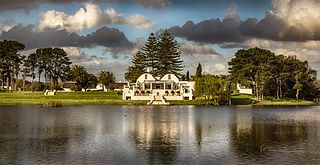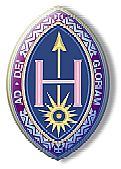Related Research Articles

Cape Town is the legislative capital of South Africa. It is the country's oldest city and the seat of the Parliament of South Africa. It is the country's second-largest city, after Johannesburg, and the largest in the Western Cape. The city is part of the City of Cape Town metropolitan municipality.

Coloureds refers to members of multiracial ethnic communities in South Africa who may have ancestry from African, European, and Asian people. The intermixing of different races began in the Cape province of South Africa, with Dutch settlers, African and Malaysian slaves intermixing with the indigenous Khoi tribes of that region. Later various other European nationals also contributed to the growing mixed race people, who would later be officially classified as coloured by the apartheid government in the 1950s.

The University of Cape Town (UCT) is a public research university in Cape Town, South Africa. Established in 1829 as the South African College, it was granted full university status in 1918, making it the oldest university in South Africa and the oldest university in Sub-Saharan Africa in continuous operation.

Bergvliet is a suburb of Cape Town, South Africa. Bergvliet, which means "Mountain Streamlet" in Afrikaans, is bordered by Retreat, Meadowridge, Tokai, and Heathfield.

Lesbian, gay, bisexual, and transgender (LGBT) people in South Africa have the same legal rights as non-LGBT people. South Africa has a complex and diverse history regarding the human rights of LGBT people. The legal and social status of between 400,000–over 2 million lesbian, gay, bisexual, transgender and intersex South Africans has been influenced by a combination of traditional South African morals, colonialism, and the lingering effects of apartheid and the human rights movement that contributed to its abolition.

Tamboerskloof is a neighbourhood and suburb of Cape Town, South Africa. It lies on the slopes of Lion's Head and Signal Hill, adjacent to the neighbourhoods of Gardens and Bo-Kaap. Tamboerskloof is one of the contiguous group of neighbourhoods referred to as the City Bowl.

Herschel Girls School is a private, weekly boarding and day school for girls, located in Claremont, a southern suburb of Cape Town, Western Cape, South Africa. The school has pre-nursery through to grade 12 and is affiliated with the Anglican church, which owns the school buildings.

Lesbian, gay, bisexual, and transgender (LGBT) people in Cape Verde are afforded some legal protections, and Cape Verde is considered a gay tolerant country. Homosexual activity has been legal in Cape Verde since 2004. Additionally, since 2008, employment discrimination on the basis of sexual orientation has been banned, making Cape Verde one of the few African countries to have such protections for LGBT people. Nevertheless, Cape Verde does not recognize same-sex unions or marriages, meaning that same-sex couples may still face legal challenges not experienced by non-LGBT residents. Households headed by same-sex couples are also not eligible for the same legal protections available to opposite-sex couples.
Corrective rape, also called curative rape or homophobic rape, is a hate crime in which one or more people are raped because of their perceived sexual orientation, such as homosexuality or bisexuality. The common intended consequence of the rape, as claimed by the perpetrator, is to turn the person heterosexual.

Noxolo Kiviet is a South African politician who has served as the Minister of Public Service and Administration since March 2023. She was formerly the Deputy Minister of Public Works and Infrastructure from 2019 to 2023 and also served as the Premier of the Eastern Cape from 2009 to 2014.

The rate of sexual violence in South Africa is among the highest recorded in the world. Police statistics of reported rapes as a per capita figure has been dropping in recent years, although the reasons for the drop has not been analysed and it is not known how many rapes go unreported. More women are attacked than men, and children have also been targeted, partly owing to a myth that having sex with a virgin will cure a man of HIV/AIDS. Rape victims are at high risk of contracting HIV/AIDS owing to the high prevalence of the disease in South Africa. "Corrective rape" is also perpetrated against LGBT men and women.

The Alteration of Sex Description and Sex Status Act, 2003 is a South African Act of Parliament which allows a person to change, under certain conditions, their sex recorded in the population registry.

Feminist Africa is a peer-reviewed academic journal that addresses feminist topics from an "African continental perspective". It is published by the African Gender Institute. Its founding editor-in-chief is Amina Mama. It was accredited in 2005 by the South African Department of Education. This allows authors publishing in the journal to collect publication subsidy. The journal is primarily online but also distributes a small number of print copies.

The African Gender Institute (AGI) is a feminist research and teaching group that studies issues related to gender in Africa. It has become a department at the University of Cape Town (UCT), administered within the School of African and Gender Studies, Social Anthropology and Linguistics. The AGI has its own staff and has a unique degree of independence from UCT.

Harold Cressy High School is a secondary school in District Six of Cape Town in South Africa. It was founded in January 1951 as the Cape Town Secondary School. The school has played a substantial role in South African history during the apartheid period and the building is identified as an important landmark.
Lotus River is a suburb of Cape Town in South Africa. Lotus River is found at an elevation of 11 metres above sea level.

Feminism in South Africa concerns the organised efforts to improve the rights of the girls and women of South Africa. These efforts are largely linked to issues of feminism and gender equality on one hand, and racial equality and the political freedoms of African and other non-White South African ethnic groups on the other. Early feminist efforts concerned the suffrage of White women, allowing them to vote in elections beginning from 1930s, and significant activism in the 1950s to demand equal pay of men and women. The 1980s were a major turning point in the advancement of South African women, and in 1994, following the end of the apartheid regime, the status of women was bolstered by changes to the country's constitution. Since the end of apartheid, South African feminism is a contribution associated with the liberation and democratization of the country, however, the movement still struggles with the embedded conservative and patriarchal views within some segments of South African society.
Marie Elizabeth Sukers is a South African politician from the Western Cape who has been a Member of the National Assembly of South Africa for the African Christian Democratic Party since May 2019.
Elaine Rosa Salo was a South African anthropologist, scholar and activist, who specialised in gender studies and African feminism. She taught at the University of the Western Cape, the University of Cape Town, the University of Pretoria, and, until her death from cancer, at the University of Delaware.
Gobonamang Prudence Marekwa is a South African politician, trade unionist and police officer who has served as a Member of the National Assembly of South Africa since November 2021, representing the African National Congress.
References
- Sanger, Nadia; Hadland, Adrian (2008). "Challenging Patriarchal Scripts? A Gender Analysis of South Africa's Community Print Media". Agenda: Empowering Women for Gender Equity (77): 4–17. ISSN 1013-0950.